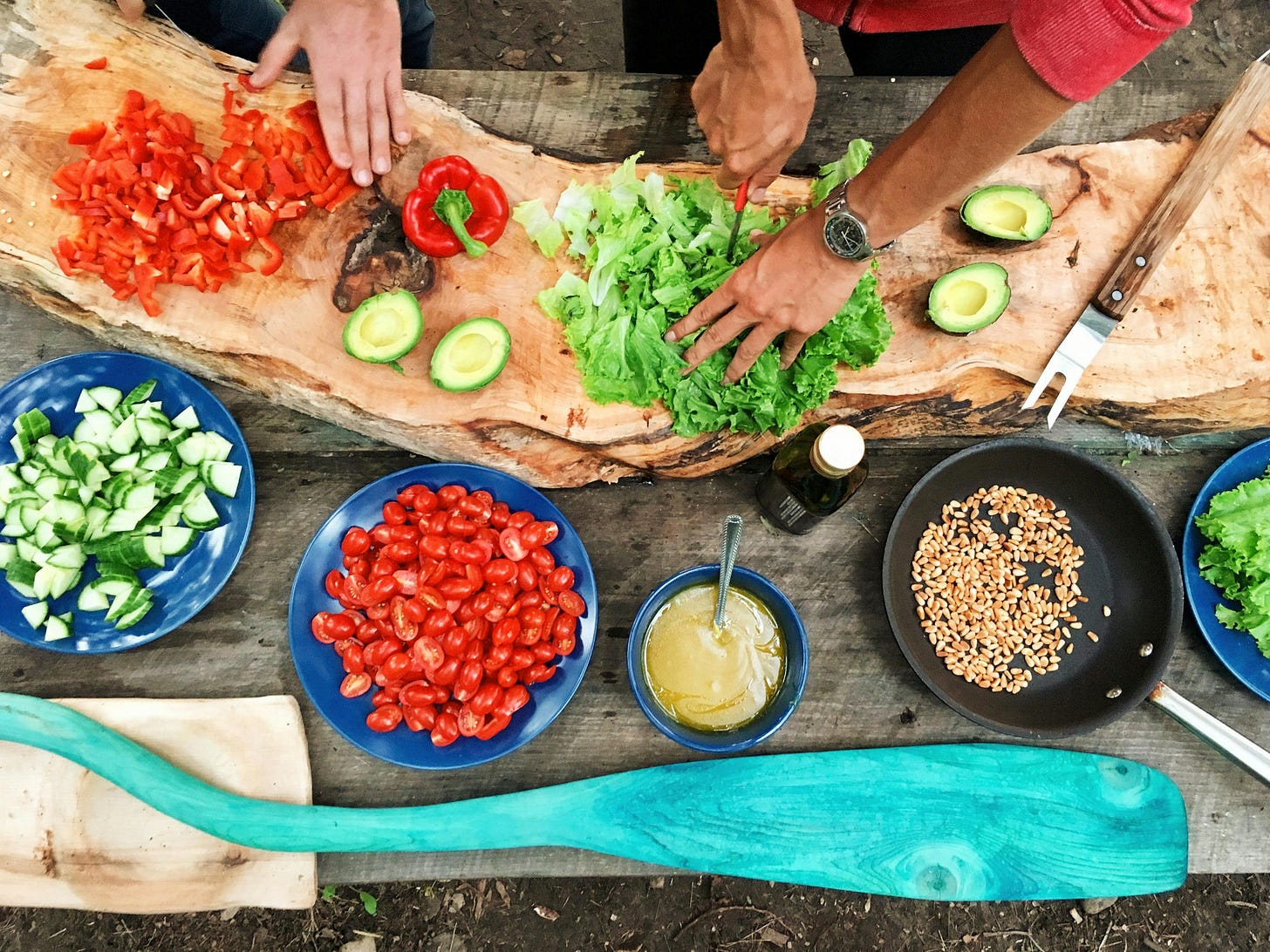Last week, I shared how my Sunday morning coffee ritual had become more than a quiet moment in the backyard. This week, I want to explore how that same mindfulness extends to what's in my coffee cup and on my plate - and how it affects everything from my mental clarity to my coaching effectiveness.
Let me share a recent "aha" moment. During a coaching session with a stressed-out HR administrator, she shared that she was drinking her fourth cup of coffee and hadn't eaten lunch at 2:30 p.m. This reminded me of my experiences in education, when I'd power through on caffeine and grab whatever was quick and convenient. The cost? Afternoon brain fog, irritability, and sometimes regrettable decisions.
Choices
The LEAP framework reminded me of something crucial: Our food choices and mental state are deeply connected. When I started paying attention to this link, I noticed patterns. Those mid-afternoon slumps weren't just about being busy—they were my body's response to skipping lunch or choosing the wrong foods.
But here's what's interesting - it's not just about the food. The mental domain of the LEAP Framework also showed how poor my food choices were - how we eat matters as much as what we eat. As an educator, I often ate while answering emails or during meetings. Because I have the time now, I treat meals as mini-breaks for both body and mind. Even a 15-minute lunch away from my desk helps me reset and refocus. This shift has rippled through other areas of my life.
While most of you are still working in classrooms or district/college offices and don't have the benefit of time, you can reorganize your day, or at least a small part of your day. Even 10 minutes can begin to make a difference in how you feel.
Remember those walking meetings I mentioned last week? They've evolved. Now, when I walk with Tom, I pack healthy snacks and find a spot halfway to sit and reflect. These moments of pause - combining movement, nutrition, and meaningful conversation - have led to some of our best insights. The science backs this up. Research shows that people who maintain healthy eating habits demonstrate better problem-solving skills and creativity.
It's not just about fueling our bodies—it's about creating the conditions for our minds to thrive. My home office has evolved, too. That reading nook I mentioned last time now has a small shelf with healthy snacks and a water pitcher. It's incredible how having good options within reach makes better choices more manageable. And yes, I still keep dark chocolate nearby because balance matters more than perfection.
Changes
In implementing the learning from working on the LEAP Framework, the schedule below reflects some of what I've incorporated into my day:
Morning Mental Clarity Routine:
20 minutes of meditation just after waking up
Intermittent fasting with a balanced meal with protein, vegetables, and whole grains
A quick review of my day's priorities while the coffee brews
Daily 3.5 miles walk
Midday Energy Management:
Scheduled lunch breaks away from my desk
Light, protein-rich snacks between coaching sessions
Five-minute breathing exercises after meals
Evening Wind-Down:
No caffeine after 2 PM
Light dinner at least two hours before bed
Gratitude journaling while sipping herbal tea
But the most powerful change has been involving my family. Sunday meal prep has become a time for connection. While we chop vegetables and plan the week's meals, conversations flow naturally. I've noticed this approach influencing my coaching practice, too. When educators tell me they're struggling with stress or decision-making, we now look at their eating patterns and work habits. Often, small changes in nutrition create surprising improvements in their mental clarity and emotional resilience.
Looking Ahead
I'm excited to keep exploring these connections. The LEAP framework reminds us that true wellness isn't about rigid rules but finding patterns that help us thrive in all areas of life.
For those wanting to start their own journey:
Remember, this isn't about perfect eating or constant mental discipline. It's about understanding how nourishing your body supports your mind and vice versa. Even the smallest changes, when consistently applied, can create powerful shifts. This realization can empower you to take the first step towards a healthier, more mindful lifestyle.
Next week, we'll explore how these domains relate to Hearth, Home, and Financial Condition. Until then, I encourage you to notice your patterns. How does what you eat affect how you think and feel? What small changes make a big difference in your day? After all, true success isn't just about what we achieve—it's about how we feel and function along the way. When we nourish both body and mind, everything else flows more naturally.
Reflection Questions
"When did you last notice of your food choices affecting your mood or mental clarity? What did you learn from that experience?"
"Think about your most productive days - how do your eating patterns differ on those days compared to when you feel mentally foggy?"
"What eating habits from your busy work life still linger, and how might they impact your mental well-being?"
"Which meals or food rituals in your life create space for meaningful connections with others, and how do these moments affect your mental state?"
"If you tracked your energy levels and food choices for a week, what patterns would you discover about your mental performance?"
Tasks
Create a one-week food and mood diary, noting how different meals affect your energy levels and mental clarity during work hours. This simple practice can reveal patterns you might have missed in your daily routine.
Set up a dedicated space in your home or office for mindful eating near a window or in a quiet corner. This place should allow you to take actual lunch breaks away from screens and focus on your meals and thoughts.
Plan three "brain-friendly" meals for your workweek, including foods that support mental clarity (like fatty fish, nuts, or leafy greens). Notice how these choices affect your focus during essential meetings or coaching sessions.
Start a weekly ritual of preparing Sunday dinner with family or friends. Use this time for meal prep, meaningful conversations, and mental unwinding before the week ahead.
Schedule two 15-minute breaks in your workday specifically for nourishment - whether that's having a healthy snack, doing a quick meditation, or both - and stick to these breaks like any other necessary appointment.'







